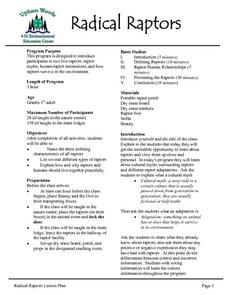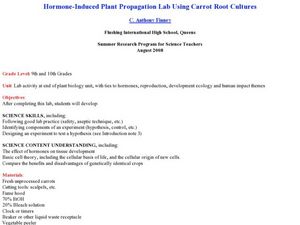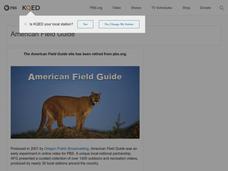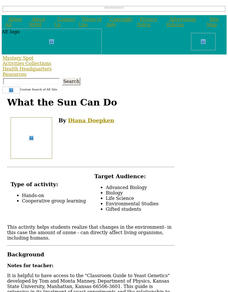Curated OER
How Does a Pedigree Help Us to Trace a Trait That is Inherited?
Learners analyze genetic patterns. In this pedigree lesson, students determine dominant or recessive inheritance. They construct a human pedigree from genetic information.
Curated OER
Cancer as a Multistep Process
Students analyze the causes of cancer from a genetic standpoint. They explain the increase in cancer with age and create a hypothesis for cancer development. They use the laws of probability as well.
Curated OER
Radical Raptors
Students are introduced to raptors and their role in the environment. They identify three characteristics of raptors and list several types of raptors found in nature. They discuss their positive and negative experiences with raptors and...
Curated OER
Time Conceptualization
Students relate the number and length of generations in their living family members to the number of generations that have passed since specific events in recorded history. They then apply this time conceptualization to the number of...
Curated OER
DNA and RNA
Tenth graders research the history and discovery of DNA. Using their text, they label a basic DNA structure and the composition of genes. They explain how RNA and DNA differ from one other and discuss the processes of transcription and...
Curated OER
Body Organization and Organ Systems
Eighth graders begin the lesson by building a house of cards. They discuss ways that building a house of cards is similar to the way the body is built: different systems work together to help the whole body work together. Students listen...
Curated OER
Neuroscience for Kids
In this neuroscience learning exercise, students explore the Neuroscience for Kids website and then complete the questions. Students compare axons and dendrites, the central, peripheral, and autonomic nervous system, and the different...
Access Excellence
High School Students Experience Feelings of Being Handicapped
Your genetics juniors will benefit from this lesson. They read an article about a Special Olympics winner and then discuss how life might be for someone who suffers from Down Syndrome.
Curated OER
Bioethics and the HGP
Learners analyze case studies using the rules and principles of ethics. They comprehend which rules and principles of theics are of great importance to the Human Genome Project. Students participate in mock student hearings.
Curated OER
The Use of Biocards for Topical Review
Students create biocards to represent vocabulary from their biology course. They review and reinforce their basic knowledge of terminology, structures, or concepts. They create the cards to test themselves or classmates.
Curated OER
Hormone-Induced Plant Propagation Lab using Carrot Root Cultures
Students evaluate the importance of hormones in living things. In this biology lesson, students experiment on carrots to differentiate how humans and plants reproduce. They collect data from experiment to answer analysis questions.
Curated OER
Blood Business
Students identify the different kinds of blood. In this biology lesson plan, students investigate the antigens, agglutinins and Rh factor using their own blood. They use Punnett squares to predict blood type of offspring.
Curated OER
Finding, Gathering, Saving Seeds
Students understand the importance of saving seeds. In this saving seeds lesson, students dry out seeds for later use planting. Students recognize that one plant may have many seeds.
American Society for Microbiology
”Build a Bacterium” Scavenger Hunt
An exciting activity has scholars use cell parts to build bacteria through cooperation with other groups. Each group has some of the cell parts needed, but they must trade with other groups to be able to fulfill their function as a...
Serendip
Using Molecular and Evolutionary Biology to Understand HIV/AIDS and Treatment
HIV mutates rapidly, making treatments challenging to find. Scholars learn about why it mutates so quickly and how scientists race to find treatments. The resource approaches the issue from both a molecular and evolutionary perspective...
Curated OER
What can I do?
Learners identify feelings and explore positive ways to handle conflict. In this mental health lesson students discuss feelings and how to constructively handle them.
Curated OER
Flowers and Plants
Students are assigned to bring five flowers. They explore flowers to distinguish different physical features of flowers. They compare and contrast different flowers to determine what features they have in common. Students develop an...
Curated OER
Biotechnology and The Chocolate Milk Cow
Students discuss new discoveries that have resulted from the use of recombinant DNA technology and otehr biotechnology. In groups, they create a transgenic cow capable of producing chocolate-flavored milk.
Curated OER
Plant Structure and Growth
This plant structure and function PowerPoint addresses the main organs and the factors that affect its development as well as going into detail about the specializations at a cellular level. The cell functions and system...
Curated OER
Chapter 5: Socializing the Individual
In this socializing the individual worksheet, high schoolers respond to 6 multiple choice questions and 14 fill in the blank questions pertaining to how one learns to live within their culture.
Curated OER
Ancient Man in Asia
Seventh graders analyze and synthesize information about major historical developments by interpreting data, evaluation sources of information, identifying and comparing experiences and perspectives from multiple cultural perspectives.
Curated OER
Frankenstein
Students use an outline of the story "Frankenstein" to identify mistakes in English. They practice making corrections to make the sentence correct. They answer questions to end the lesson.
Curated OER
What the Sun Can Do
Learners develop and test a unique, personally-relevant hypothesis about the consequences of exposure to UV radiation based units on a living organism, common baker's yeast (Saccharomyces cerevisiae).
Curated OER
Live Well Now to Live Longer Later
Ninth graders select a topic to research, completing the sentence, "Are the effects of _______ really that detrimental to one's health?" They record information in a journal, including sources of information. Students work in groups with...

























